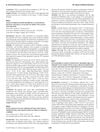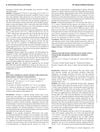 72 citations,
October 1998 in “Baillière's clinical endocrinology and metabolism”
72 citations,
October 1998 in “Baillière's clinical endocrinology and metabolism” Long-term testosterone therapy can cause hormone suppression, affect prostate and heart health, and alter physical characteristics, but does not increase prostate cancer risk and needs more research for full risk assessment.
 May 1981 in “Inpharma (Balgowlah)”
May 1981 in “Inpharma (Balgowlah)” Medroxyprogesterone acetate improved sleep apnea symptoms in some obese patients.
 20 citations,
August 2022 in “Archives of Medical Science”
20 citations,
August 2022 in “Archives of Medical Science” The Polish medical societies have redefined metabolic syndrome and recommend lifestyle changes, certain medications, and possibly bariatric surgery for treatment. They also discuss managing related health conditions.
 129 citations,
January 2019 in “Clinical medicine insights”
129 citations,
January 2019 in “Clinical medicine insights” Obesity worsens PCOS symptoms, and PCOS may lead to more weight gain; managing both requires a holistic approach that includes mental health.

Some drugs may increase the risk of obstructive sleep apnea, while others like certain biologics might decrease it.

Losing weight and eating better are key to managing metabolic syndrome and its related conditions.
 2 citations,
April 2018 in “SLEEP”
2 citations,
April 2018 in “SLEEP” People with rheumatoid arthritis have poorer sleep quality than healthy individuals.
 1 citations,
April 2018 in “Sleep”
1 citations,
April 2018 in “Sleep” Finasteride increases risk of sleep apnea and insomnia.
 October 2007 in “Current Respiratory Medicine Reviews”
October 2007 in “Current Respiratory Medicine Reviews” Women with PCOS are much more likely to have sleep problems and should be checked for them.
 June 2016 in “CRC Press eBooks”
June 2016 in “CRC Press eBooks” Sleep problems and skin issues affect each other; poor sleep can worsen skin conditions, and some skin treatments can improve or harm sleep quality.
 2 citations,
August 2021 in “Journal of Turkish sleep medicine”
2 citations,
August 2021 in “Journal of Turkish sleep medicine” People with polycystic ovary syndrome are more likely to have poor sleep, restless legs syndrome, anxiety, and depression.
 1 citations,
April 2018 in “SLEEP”
1 citations,
April 2018 in “SLEEP” People with obstructive sleep apnea are more likely to get herpes zoster, but nightmares don't affect the risk.
 62 citations,
July 2017 in “Endocrine connections”
62 citations,
July 2017 in “Endocrine connections” Adults with polycystic ovary syndrome are much more likely to have obstructive sleep apnea.
 105 citations,
February 2011 in “The Journal of Clinical Endocrinology & Metabolism”
105 citations,
February 2011 in “The Journal of Clinical Endocrinology & Metabolism” Treating sleep apnea in young obese women with PCOS can improve heart health and insulin sensitivity.
 March 2023 in “Seminars in reproductive medicine”
March 2023 in “Seminars in reproductive medicine” PCOS often leads to sleep problems, especially obstructive sleep apnea, affecting overall health.
 43 citations,
October 2019 in “Pediatric Research”
43 citations,
October 2019 in “Pediatric Research” Lifestyle changes are the main treatment for PCOS, which is a complex condition requiring early management to reduce its health impacts.
 53 citations,
January 2012 in “Fertility and Sterility”
53 citations,
January 2012 in “Fertility and Sterility” Women with PCOS are more likely to have sleep apnea, mainly if they are obese.
 5 citations,
August 2018 in “International Journal of Dermatology”
5 citations,
August 2018 in “International Journal of Dermatology” Men with sleep apnea and low iron levels are more likely to have male-pattern baldness, especially if they have a family history of hair loss.
66 citations,
March 1998 in “Mayo Clinic Proceedings” Removing a testosterone-producing tumor cured a woman's sleep apnea and other symptoms.
 10 citations,
August 2022 in “Journal of clinical sleep medicine”
10 citations,
August 2022 in “Journal of clinical sleep medicine” Transgender youth have more sleep disorders, but gender-affirming therapy may help reduce them.
 June 1996 in “Irish Journal of Medical Science (1971 -)”
June 1996 in “Irish Journal of Medical Science (1971 -)” The document summarizes medical findings on topics like heart rhythm treatment, sleep apnea therapy, and various health conditions and treatments.

The trial aims to understand how obesity and lifestyle affect circadian rhythms in people with schizophrenia and bipolar disorder.
 18 citations,
October 2021 in “Frontiers in Physiology”
18 citations,
October 2021 in “Frontiers in Physiology” Lipocalin-Type Prostaglandin D2 Synthase (L-PGDS) is a protein that plays many roles in the body, including sleep regulation, pain management, food intake, and protection against harmful substances. It also affects fat metabolism, glucose intolerance, cell maturation, and is involved in various diseases like diabetes, cancer, and arthritis. It can influence sex organ development and embryonic cell differentiation, and its levels can be used as a diagnostic marker for certain conditions.
 January 2024 in “Diabetes & metabolism journal”
January 2024 in “Diabetes & metabolism journal” Disrupting natural body clocks increases the risk of developing type 2 diabetes.
 27 citations,
January 2013 in “Indian Journal of Dermatology, Venereology and Leprology”
27 citations,
January 2013 in “Indian Journal of Dermatology, Venereology and Leprology” PCOS is a complex disorder managed by treating symptoms and requires a team of specialists.
 October 2022 in “Springer eBooks”
October 2022 in “Springer eBooks” The document concludes that personalized hormonal treatments are important for transgender individuals and more research is needed for non-binary treatments.
 6 citations,
August 2023 in “European journal of endocrinology”
6 citations,
August 2023 in “European journal of endocrinology” The 2023 guideline advises a detailed approach for PCOS, focusing on early detection, lifestyle and medical treatments, and managing health risks.
 February 2024 in “Journal of ayurveda and integrated medical sciences”
February 2024 in “Journal of ayurveda and integrated medical sciences” Ayurvedic treatment and Yoga Basti therapy improved a woman's PCOS symptoms.
 December 2018 in “Evidence-Based Practice”
December 2018 in “Evidence-Based Practice” Topical minoxidil 1% and 2% are twice as effective as placebo for female pattern hair loss.
 July 2022 in “International journal of medical science and clinical invention”
July 2022 in “International journal of medical science and clinical invention” Women with irregular periods should be checked for PCOS and treated early to prevent complications, with birth control pills helping to manage symptoms.




























